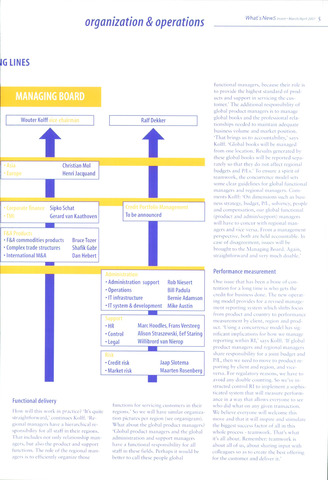organization operations
MANAGING BOARD
IG LINES
What'sNewS Insert March/April 2001
Wouter Kolff
Ralf Dekker
Christian Mol
HenriJacquand
Corporate fina
•TM
Sipko Schat
Gerard van Kaathoven
Tobeannounced
F&A commodities products
Complex trade structures
International M&A
BruceTozer
Shafik Gabr
Dan Hebert
Administration support
Operations
IT infrastructure
IT system development
Rob Niesert
Bill Padula
Bernie Adamson
Mike Austin
•HR
Mare Hoodles, Frans Versteeg
Control
Alison Straszewski, Eef Staring
Legal
Willibrord van Nierop
Risk
•Credit risk
JaapSlotema
Market risk
Maarten Rosenberg
Functional delivery
Performance measurement
How will this work in practice? 'It's quite
straightforward,' continues Kolff. 'Re-
gional managers have a hierarchical re-
sponsibility for all staff in their regions.
That includes not only relationship man
agers, but also the product and support
functions. The role of the regional man
agers is to efficiently organize those
functions for servicing customers in their
regions.' So we will have similar organiza
tion pictures per region (see organigram).
What about the global product managers?
'Global product managers and the global
administration and support managers
have a functional responsibilitv for all
staff in these fields. Perhaps it would be
better to call these people global
functional managers, because their role is
to provide the highest Standard of prod
ucts and support in servicing the cus-
tomer.' The additional responsibility of
global product managers is to manage
global books and the professional rela-
tionships needed to maintain adequate
business volume and market position.
'That brings us to accountability,' says
Kolff. 'Global books will be managed
from one location. Resulrs generated by
these globai books will be reported sepa-
rately so that they do not affect regional
budgets and P/Ls.' To ensure a spirit of
teamwork, the concurrence model sets
some clear guidelines for global functional
managers and regional managers. Com-
ments Kolff: 'On dimensions such as busi
ness strategy, budget, P/L, solvency, people
and compensation, our global functional
(product and admin/support) managers
will have to concur with regional man
agers and vice-versa. From a management
perspective, both are held accountable. In
case of disagreement, issues will be
brought to the Managing Board. Again,
straightforward and very much doable.'
One issue that has been a bone of con-
tention for a long time is who gets the
credit for business done. The new operat-
ing model provides for a revised manage
ment reporting system which shifts focus
from product and country to performance
measurement by cliënt, region and prod
uct. 'Using a concurrence model has sig
nificant implications for how we manage
reporting within RI," says Kolff. 'If global
product managers and regional managers
share responsibility for a joint budget and
P/L, then we need to move to product re
porting by cliënt and region, and vice-
versa. For regulatory reasons, we have to
avoid any doublé counting. So we've in-
structed control R1 to implement a sophis
ticated system that will measure perform
ance in a way that allows everyone to see
who did what on any given transaction.
We believe everyone will welcome this
move and that it will inspire and stimulate
the biggest success factor of all in this
whole process - teamwork. That's what
it's all about. Remember: teamwork is
about all of us, about sharing input with
colleagues so as to create the best offering
for the customer and deliver it.'

